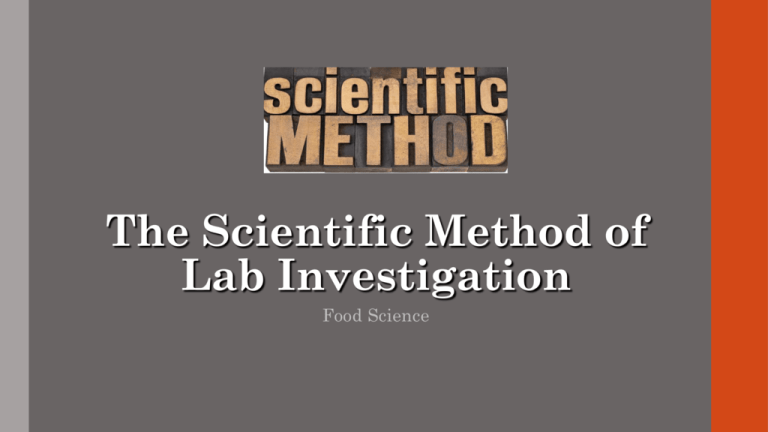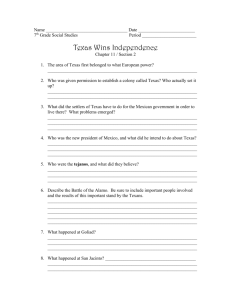
The Scientific Method of
Lab Investigation
Food Science
Copyright
Copyright © Texas Education Agency, 2015. These Materials are copyrighted © and trademarked ™ as the
property of the Texas Education Agency (TEA) and may not be reproduced without the express written permission of
TEA, except under the following conditions:
1) Texas public school districts, charter schools, and Education Service Centers may reproduce and use copies of
the Materials and Related Materials for the districts’ and schools’ educational use without obtaining
permission from TEA.
2) Residents of the state of Texas may reproduce and use copies of the Materials and Related Materials for
individual personal use only, without obtaining written permission of TEA.
3) Any portion reproduced must be reproduced in its entirety and remain unedited, unaltered and unchanged in
any way.
4) No monetary charge can be made for the reproduced materials or any document containing them; however, a
reasonable charge to cover only the cost of reproduction and distribution may be charged.
Private entities or persons located in Texas that are not Texas public school districts, Texas Education Service
Centers, or Texas charter schools or any entity, whether public or private, educational or non -educational, located
outside the state of Texas MUST obtain written approval from TEA and will be required to enter into a license
agreement that may involve the payment of a licensing fee or a royalty.
For information contact: Office of Copyrights, Trademarks, License Agreements, and Royalties, Texas Education
Agency, 1701 N. Congress Ave., Austin, TX 78701-1494; phone 512-463-7004; email: copyrights@tea.state.tx.us.
Copyright © Texas Education Agency, 2015. All rights reserved.
2
What is Science?
The use of evidence
to construct
testable
explanations and
predictions of
natural phenomena
as well as the
knowledge
generated
through this
process
This vast body of changing and increasing knowledge
is described by physical, mathematical and
conceptual models
Copyright © Texas Education Agency, 2015. All rights reserved.
3
The Scientific Method
A system of steps used to investigate,
answer questions and solve problems
Copyright © Texas Education Agency, 2015. All rights reserved.
4
Scientific Method Steps
1.
Question
2.
Hypothesis
3.
Experiment
4.
Analyze Data
5.
Conclusions
Copyright © Texas Education Agency, 2015. All rights reserved.
5
Step 1 – Question
•
Identify the problem
•
State it clearly as a question
Copyright © Texas Education Agency, 2015. All rights reserved.
6
Step 2 - Hypothesis
•
Predict a possible answer
Copyright © Texas Education Agency, 2015. All rights reserved.
7
Step 3 - Experiment
•
Test the hypothesis
•
Develop and follow a procedure
Copyright © Texas Education Agency, 2015. All rights reserved.
8
Analyze Data
•
Evaluate the information
•
Include charts, diagrams or graphs
Copyright © Texas Education Agency, 2015. All rights reserved.
9
Step 5 - Conclusions
•
Report your results
•
Share with your classmates
Copyright © Texas Education Agency, 2015. All rights reserved.
10
(click on image for video)
The Scientific Method: Steps, Terms and Examples
Copyright © Texas Education Agency, 2015. All rights reserved.
11
Organizing Data
Charts, Diagrams and Graphs
Copyright © Texas Education Agency, 2015. All rights reserved.
12
Charts
•
Used to:
detail steps in a procedure
list explanation of terms
show rank order
Copyright © Texas Education Agency, 2015. All rights reserved.
13
Diagrams
•
Used to show:
comparisons
deductive reasoning
relationships
Copyright © Texas Education Agency, 2015. All rights reserved.
14
Graphs
•
Used to show:
relationship of a variable to
one or more other variables
Copyright © Texas Education Agency, 2015. All rights reserved.
15
Questions?
Copyright © Texas Education Agency, 2015. All rights reserved.
16
References and Resources
Images:
• Shutterstock™ images. Photos obtained with subscription. (Slides 1, 4, 5, 6, 7, 8, 9, 10, 11,
15)
Textbook(s):
• Mehas, K. Y., & Rodgers, S. L. (2002). Food science: The biochemistry of food and nutrition.
New York, NY: Glencoe/McGraw-Hill.
• Ward, J. D., & Ward, L. T. (2013). Principles of food science. Tinley Park, IL: GoodheartWillcox Company.
YouTube™:
• Science Style (Gangnam Style Parody/Piggyback)
Piggyback song to teach the scientific method using "Gangnam Style" by PSY.
http://youtu.be/MyFi6BQfDik
• The Scientific Method: Steps, Terms and Examples
In order to gain knowledge about the world however the steps involved in the
scientific method vary widely among the different scientific disciplines
http://youtu.be/BVfI1wat2y8
Copyright © Texas Education Agency, 2015. All rights reserved.
17







